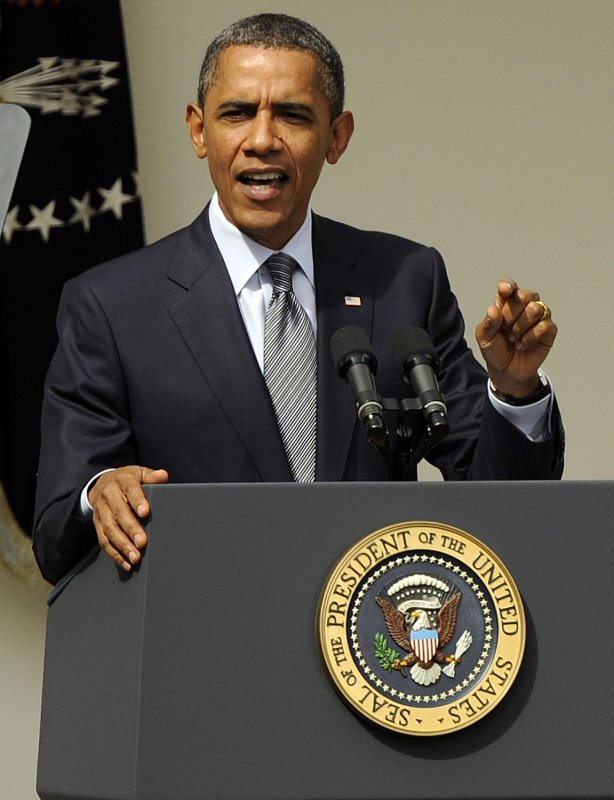1 of 3 | U.S. President Barack Obama discusses his vision for deficit reduction, including spending cuts and tax increases, and makes recommendations to the Joint Committee on Deficit Reduction in the Rose Garden of the White House in Washington on September 19, 2011. UPI/Roger L. Wollenberg |
License Photo
WASHINGTON, Sept. 19 (UPI) -- President Obama's plan to reduce the U.S. deficit by about $3 trillion through the next decade would strip tax loopholes for the wealthy and big corporations.
Failure to act to reduce the budget through spending cuts and revenue increases means the "burden will ultimately fall on our children's shoulders … [and] the growing debt will crowd out everything else," Obama said in remarks Monday in the Rose Garden. "Washington has to live within its means. We have to cut what we can't afford and pay for what really matters."
Obama's proposals to the Joint Committee on Deficit Reduction called for an expiration of the lower tax rates enacted during President George W. Bush's administration. He also called for an extension of the Bush-era rate cuts for the middle class.
"We can't cut our way out of our hole," Obama said. "It's only right we ask everyone to pay their fair share."
The so-called "Buffett Rule" was named after billionaire investor Warren Buffett, who repeatedly complained the richest Americans typically pay a smaller portion of their income in federal taxes than do middle-income workers because investment gains are taxed at a lower rate than wages.
Obama said his plan would eliminate tax loopholes "that primarily go to wealthiest taxpayers and corporations. … We can't afford the special lower rates for the wealth [that were originally] meant to be temporary."
Obama said he looked forward to working with Republicans and Democrats to "eliminate loopholes that stack the deck against small business and families" who can't afford lobbyists.
He also encouraged Americans to challenge their representatives if they signed a pledge against tax increases to explain themselves.
"They should be called out. They should have to defend that unfairness," Obama said. "Our tax code shouldn't give advantage to best connected lobbyists. … We can lower (the) corporate rate if we get rid of special deals."
To those who said he was promoting class warfare, Obama said, "I reject the idea that asking a hedge fund manager to pay the same tax rate as a plumber or teacher is class warfare. I think it's just the right thing to do. … This is not class warfare. It's math."
If the wealthiest Americans and big corporations aren't asked to help reduce the deficit and grow the economy, "we've got to settle for second-rate roads and second-rate bridges and second-rate airports, and schools that are crumbling," Obama said. "That's unacceptable to me. ... And it will not happen on my watch."
He said he would not support "any plan that puts all of the burden for closing our deficit on ordinary Americans"
Obama pledged to veto any bill that would change Medicare recipients' benefits "but does not raise serious revenues by asking the wealthiest Americans or biggest corporations to pay their fair share. We are not going to have a one-sided deal that hurts the folks who are most vulnerable."
In April, he said, he discussed a balanced approach that included a line-by-line budget examination looking for waste while not endangering education, research or infrastructure construction. It also was predicated on "everybody, including the wealthiest Americans and biggest corporations, has to pay their fair share."
His proposals to the so-called supercommittee are part of "a plan that reduces our debt by more than $4 trillion and achieves these savings in a way that is fair, by asking everybody to do their part so that no one has to bear too much of the burden on their own," he said.
He said his plan cuts $2 in spending for every dollar in revenue.
Besides the $1 trillion in cuts already outlined, Obama said his proposal will make additional spending cuts through reforming agricultural subsidies, modifying federal retirement programs, adjusting payments to Fannie Mae and Feddie Mac federal home loan programs, recapturing dollars from recipients of the bank bailout program, the drawdown of U.S. forces from Iraq and Afghanistan and structural reforms to Medicare and Medicaid.
Concerning Medicare, Obama said he wouldn't allow reforms to the entitlement program "be an excuse for turning Medicare into a voucher program that leaves seniors at the mercy of the insurance industry."
Obama challenged naysayers -- particularly Republicans who have said any tax increase was dead on arrival -- saying it was "our responsibility to put country before party. It's our responsibility to do what's right for the future."
The issue wasn't "about numbers on a ledger," but about whether the United States "will do what it takes to create jobs and growth in opportunity while facing up to the legacy of debt that threatens everything we've built over generations."















